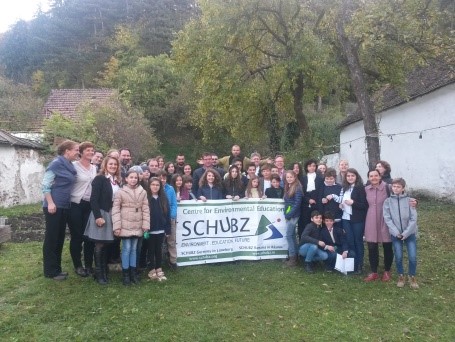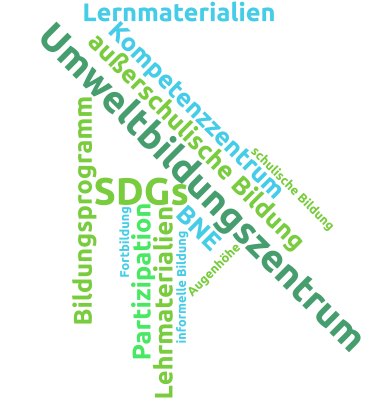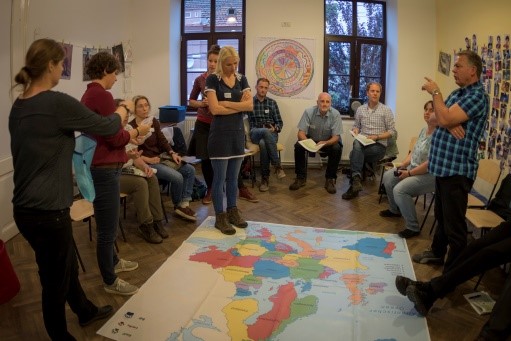Rosenau Environmental Education and ESD Competence Center (Romania)
Keywords: International activities, climate protection, sustainability education
Subject and objectives of the project
The project focused on the content and didactic design of the first Romanian environmental education center as an ESD competence center in the city of Rosenau, Transylvania, Romania. The aim was to establish the education center as a provider of educational programs and materials and as a training institution in the formal and informal sector for the integration of Education for Sustainable Development (ESD) in Romanian schools and extracurricular programs. In addition, a permanent international network between Romanian and Lower Saxon environmental education centers and extracurricular learning locations should be created for mutual professional exchange, for example in workshops or summer schools.
In a 22-month pilot phase, educational programs were developed for the environmental education center in Romania and tested regionally with pilot groups at schools and elsewhere. This was done in close exchange and constructively together with German education stakeholders. The educational programmes focus on the Sustainable Development Goals (SDGs) “Life on land” (protected areas, forest ecosystems, animals, plants, etc.), “Life under water” (watercourses), “Clean energy and climate change” (renewable energies, climate change/climate change adaptation) and “Drinking water and sanitation” (water as food, quality and influencing factors). In addition to stakeholders from school education for sustainable development, educational experts from the non-school sector were also involved. A total of eleven educational programs were developed and materials for pupils and handouts for teachers were created. Mobile toolboxes make it possible to work on the topics outside of SCHUBZ România(www.schubz.ro) and can be borrowed. Due to a nearby branch of the education center in the vicinity of a castle that is attractive to tourists, the educational programs also reach families and tourists in the area surrounding the center. An interdisciplinary project advisory board, consisting of representatives from educational practice, business, nature conservation administration and science, provided technical support for the process.
SCHUBZ România subsequently developed into a nationally recognized extracurricular education center (after the end of the pilot phase funded by the DBU). More than 3000 children are welcomed every year, ESD teacher training courses have been established in 12 counties of the country, programs have been developed to train the first nature educators in Romania and ESD training courses have been developed for the first forest school programs of private forestry companies.
In addition, another DBU-funded educational project was carried out to help young people gain a deeper ecological understanding of the fundamental importance of wilderness, biodiversity and nature conservation through the use of modern digital media.
In addition to developing an innovative digital course for film-based “storytelling” on endangered wildlife species and their habitats, the educational format was also intended to contribute to the overarching European goal of digitization. The educational program encouraged and empowered young people from Germany, Romania and Montenegro to tell stories about endangered wildlife species and their habitats using cell phone videos to inspire and educate others, as well as to publish and present their work on social media channels and share it in their networks.
The best 20 films were presented at a film festival in Rasnov, Romania, and the finalists also took part in a European exchange program with other young creative minds in Romania.
Video “Digital Storytelling for young Environmental Activists” (Copyright: Black Forest Collective)
Innovation and exemplary nature of the project
The project broke new ground in education for sustainable development in Romania by establishing the first ESD competence center in Romania based on the concept of the School Biology Center and Regional Environmental Education Center Lüneburg (SCHUBZ) in Lower Saxony. Aspects of an academy operation for environmental education and ESD as well as concrete educational offers for pupils and tourists were realized. The programmatic orientation of the center and the cooperation between NGOs, universities, protected areas and German environmental education institutions have provided important impulses for the training of teachers and the further development of environmental education and ESD in Romania. The Environmental Education Center is an important step towards the implementation of ESD in schools and extracurricular activities in Romania.
Special aspects of the project
The project has had a lasting impact beyond the project period. The project was characterized by a participatory structure – all measures were implemented on an equal footing in cooperation between Romanian and German stakeholders. The applicants’ local knowledge, language skills and intercultural skills were very helpful.
At the same time, the project covered aspects of training, further education and capacity building. The project also created an economic basis for educational services in the region; the programs can be used as a service, can be booked in tourist contexts and also offer great added value in terms of content for the Scoala Altfel, the project week for extracurricular learning prescribed in the Romanian curriculum.



Project implementation:
- SCHUBZ – Environmental Education Center of the Hanseatic City of Lüneburg, Lüneburg, Germany
- Asociatia Mioritics, Constanţa, Romania
- Black Forest Collective GmbH, Freiburg
- Centrul Educational Schubz Râșnov
Associated partners:
- Municipality of the city of Rȃșnov (Rosenau), Romania
- Piatra Craiului National Park Administration, Romania
Places of work: Germany and Romania
Funding period: July 2014 to December 2016
Project costs: Total volume: 136,925 euros, funding from DBU: 123,565 euros
Status: 03.05.2024
Cover picture: © Environmental Education Center SCHUBZ